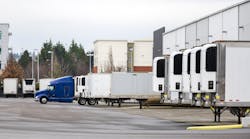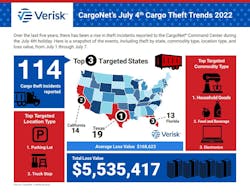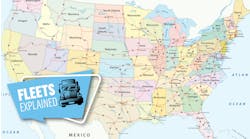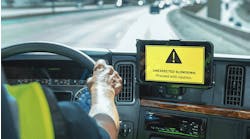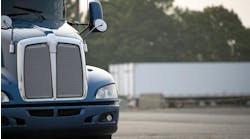Cargo theft incident reports are up 25% year-over-year and up 6% from May, according to data tracked by CargoNet. Over holiday weekends, those numbers trend higher as thieves plot and have extra time to “shop around” for sitting cargo.
“Cargo thefts have been trending upwards in recent years over the Fourth of July weekend, with opportunistic thieves taking advantage of any chance to ‘liberate’ precious cargo and vehicles from their rightful owners,” Mayank Sharma, Teletrac Navman's head of global product management and UX, told FleetOwner. “This can incur hundreds of thousands of dollars in costs for the fleets that fall victim, meaning that owners should stay especially vigilant even as they celebrate our nation’s freedom this weekend.”
In anticipation of the Fourth of July weekend, CargoNet pulled together some notable theft incidents between July 1 and July 7 over the past five years. Theft was lowest during the 2019 holiday and has been higher than average for both 2020 and 2021, according to CargoNet data. Thefts were most frequent in Texas, California, Florida, and Tennessee. More specifically, activity was most frequent in major cities such as Los Angeles, Dallas, and Memphis.
See also: Security experts advise caution ahead of holiday weekend
CargoNet highlighted some of the top thefts from previous July 4th holidays:
- $2 million of perfume from Hillsborough Township, New Jersey
- $439,895 in medical supplies from Davenport, Florida
- $352,000 of computer electronics from San Francisco
- $328,321 of toys from Trevor, Wisconsin
- $314,191 of computer electronics from Commerce, California
Scott Cornell, transportation lead and crime and theft specialist at Travelers, has been tracking cargo theft for more than 25 years and leads a dedicated cargo investigation team at Travelers. In his experience, these trends aren’t surprising. What he has noticed over the last couple of years is the fluctuation and priority of the commodities being stolen.
At the end of 2021 and beginning of 2022, for example, the hot commodity for thieves was electronics. Now, household goods have been reported as the top stolen commodity, with food and beverage moving into the No. 2 spot, vehicles and accessories coming in third, and electronics dropping to fourth in a short window of time.
This time of year, as many areas of the country brace for summer storms and natural disasters, cargo thieves also make it a point to pounce on the commodities people need most.
“One of the things I always point out is that a lot of people don’t tie themselves very closely to cargo theft, meaning cargo theft sounds like it’s something that’s far away or displaced, but it’s not,” Cornell said. “Thieves don’t have any sympathy for the fact that people are suffering through hurricanes, tornadoes, and floods. Cargo thieves see it as an opportunity. They know the stuff will be in demand, so they will steal those things, and it just makes a bad situation worse.”
Keeping cargo, drivers secure
CargoNet found that thieves most commonly target vehicles and shipments that were parked at large retail parking lots and truck stops.
“We consider theft to be elevated from the initial wave of the COVID-19 pandemic,” CargoNet said in a press release. “Constraints like staffing issues, high fuel costs, congestion problems at New Jersey/New York area ports, and rapidly changing inventory conditions are all contributing factors that can make theft of a semi-truck, semi-trailer, or its shipment more desirable.”
Organized cargo theft rings that target shipments throughout the Southeast and Midwest showed a strong presence during the Memorial Day holiday and continue to operate, CargoNet added. To mitigate the risk of theft, experts advise carriers to invest in high-security locks, tracking devices, and secured parking whenever possible.
“Oftentimes, the best form of security is for potential thieves to not know about anything they might want to steal in the first place,” Teletrac Navman’s Sharma said. “Many criminal organizations ‘case’ their potential targets, sometimes going as far as infiltrating a fleet they intend to steal from.”
As a standard security measure, Sharma advised carriers to limit information on valuables to a need-to-know basis. “If particularly valuable cargo is coming in and will be sitting largely unattended for any amount of time, don’t make a habit of telling anyone who isn’t either protecting it or otherwise directly transporting it,” he said.
When working with clients, Travelers’ cargo theft investigation team has established a three-layered approach to cargo theft prevention. The first layer, processes and procedures, involves no added cost to the carrier and is the most important level of the three, Cornell noted.
“I find that drivers feel a very strong sense of responsibility to the cargo they are hauling,” Cornell told FleetOwner. “If you provide education to the drivers and detailed information, the average driver understands that cargo theft is a risk on the road, but you can empower them a lot more if you give them the specifics.”
“One of the first things I would do is take the April/May CargoNet report and disseminate that out to my drivers and say, ‘Here’s what’s being stolen and here’s where it’s being stolen,’” he added.
One example that Cornell gives his clients is that cargo thieves will very often sit surveillance outside of distribution centers, and they will follow drivers away once they picked up their load in the hopes that driver will immediately go to the closest truck stop for fuel, rest, food, or a shower.
“What we will teach as one procedure is to have the driver do all that before they pick up the load so that when they pick up the load, they can avoid what we call a ‘red zone,’” Cornell said. “You’re going to drive 150 to 200 miles before you make your first stop because you got all that done already. The average cargo thief doesn’t want to follow you for 150 to 200 miles.”
The second layer, according to Travelers, is securing all trailers with high-security locking devices, such as air-cuff and steering column locks, particularly when a load sits over a long weekend.
The last layer is the use of technology.
“Are you using covert tracking?” Cornell suggested. “If you do have access to covert tracking, are you putting it in the cargo itself? Ultimately, that’s what the value is. A trailer might be worth anywhere from $10,000 to $40,000, but the cargo that’s in it is three to four times that depending on what that commodity is.”
See also: 'Pilferage' now the crime of choice among cargo thieves
Should cargo thieves make their move, Sharma said telematics can be a powerful tool in catching them quickly–or in helping police recover any stolen cargo or vehicles if they do manage to get away.
“Cameras and door sensors can provide alerts as soon as a vehicle is accessed outside of a vehicle’s schedule, providing an early alert that can often make the difference in allowing authorities to stop would-be thieves before they can make off with any cargo or assets,” Sharma said, adding that geofencing using GPS tracking provides an additional alert once a truck has left a designated area, providing another chance to catch thieves early in the act.
Ultimately, cargo thieves enjoy the holidays because shipping volume of desirable goods increases, as does demand. Freight brokers also should be extra diligent during the holiday season as fictitious pickups increase, CargoNet advised.
